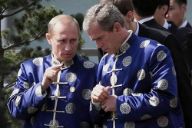A Nationalist Movement?
Discussing clothing styles with movement enthusiasts over dinner, our discussion turned to a comparison between Han Clothing and the qipao (or cheongsam) and magua (or tangzhuang). (...) Angrily contesting the dominance of these styles, informants went to great lengths to explicate their foreign and thus inferior origins. The ma in magua, they noted, refers to horses, animals that represented the Manchu identity in the Qing dynasty through the ethnic marker of horsemanship. “Look around,” one acquaintance asked, “do you see us Han riding around on horses? What use is a horse jacket (magua) to us?” The magua then was a Manchu imposition masquerading as representing China.[Carrico 2018]
The anti-Manchu rhetoric as described above by Kevin Carrico is as old as the Hanfu Movement itself. The Manchus would not wear wide sleeves, as we have seen before, nor did they wear wide collars. Though they never imposed their clothing on the majority of the Han population, some Hanfu enthusiasts believe that the Manchus were out to destroy Han culture, a project which is still ongoing.[Cf] Part of their criticism comes from the fact that many stereotypes about Chinese dress actually stem from Manchu inspired clothing, not Han Chinese.
Contemporary ‘uncivilised practices’ are also said to be introduced to civilized China by the Manchus. This rhetoric reinforces the belief of Han supremacy, which existed long before the invention of the internet, where the ‘civilized’ Han Chinese believe themselves to be superior to the ‘uncivilized’ barbarians, such as the Manchus. This rise in Han Chinese nationalism started to gain traction in the past few decades. [Cf]
The Hanfu Movement thus has followers who are part of this new turn, where Han Chinese want to restore the glory of their past and turn away from Western and Manchu influences.[Carrico 2018] In this way, the Hanfu Movement can also be seen as a nationalist movement, that tries to reshape the Han Chinese role in China.
It remains interesting that, as we have seen, there is no uniform, historical clothing that can be named Hanfu. The same goes for the existence of a Han race, which is disputed by scholars, but a number of Hanfu Movement enthusiasts still believe in their cause: promoting a purified vision of Chinese tradition and contemporary identity, devoid of any polluting “foreign” influences.[Carrico 2018] This idea of a purified Chinese tradition is, however, an idea lacking foundation, since there is no such thing. Then again, the lack of historical foundations does not seem to matter to those who propagate the more nationalistic aspects of the Hanfu Movement.
On a final note, it must be stated that the movement spans from hardcore Han nationalists, to white-collar workers and students who simply look for an escape from the hectic modern world and a sense of community within modern China.[Leibold 2010, p 550]
](https://micrio.thingsthattalk.net/NZfXt/views/max/128x128.jpg)
